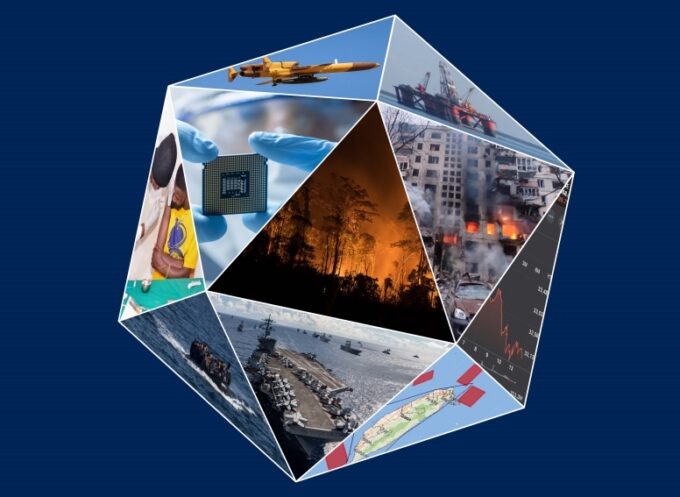Reviewing Socialist Register 2024

Cover art for the book A New Global Geometry? Socialist Register 2024
The essays in A New Global Geometry? Socialist Register 2024, an annual publication, unpack a wide range of anti-capitalist analyses on past and current political and social contradictions and relations. The contributors’ field of inquiry ranges from China to Germany, India, Japan, Latin America, Turkey and the US.
The volume under review maps global capitalism’s ebbs and flows during and after the years between the Great Recession and the COVID-19 pandemic. For example, James Meadway’s essay is titled “The first crisis of the Anthropocene: the world economy since Covid.”
An overarching theme in this volume maps the changing factors and forces around Uncle Sam’s role atop the global system. What are the meanings of American leadership in a world system evolving from unipolar order to one that is multipolar?
Jerome Klassen and Ingo Schmidt weigh in on the US political economy in an era where the global balance of power is shifting away from Wall Street and Washington. Klassen in part fleshes out Pres. Biden’s pursuit of “armed primacy,” with the proxy war against Russia, in the context of the US rise to power after World War 2.
How do strategies for a socialist transition connect with the aforementioned evolution of the global system of nation-states? The end of history that Fukuyama opined about after the fall of the former Soviet Union and finality of capitalism forevermore has given way to ongoing chaos and uncertainty amid the existential crises of eco-collapse and escalatory wars.
What are the meanings of counterrevolutionary dangers such as thermonuclear war? A useful starting point is John Bellamy Foster’s essay “The US quest for nuclear primacy: the counterforce doctrine and the ideology of moral asymmetry.”
Consider rise of the Chinese economy. A “digital tech war” between China and the US, its history and global context, is the special focus of Tanner Mireles, situating the dynamics of this rivalry in and out of the American Empire.
Achin Vanaik looks at the “nationalist character of the ruling elite” of India concerning its domestic and foreign policies in the era of Modi’s BJP Party. We hear and see echoes of former Pres. Trump’s sowing of division and fear, neofascism’s playbook as late-stage global capitalism careens from one flashpoint of conflict to the next.
Ken C. Kawashima explores the pre-war and post-war social ruptures and structures in Japan. His essay “Japan’s ‘new pre-war’: five dislocations of its historical development” begins with a materialist analysis of the nation’s development as a capitalist society facing off with European and North American power, beginning in the 19th century.
Thomas Sablowski traces the role of Germany in global capitalism. He begins with “the German economy’s fragile foundations and internal transformations,” and wraps up with socialist alternatives to rising neofascist tendencies, or the global virus of Trumpism that has gained strength from the spread of neoliberalism since the fSU imploded.
Alan Cafruny and Vassilis K. Fouskas’ essay “Europe, the world economy and new imperial grossraums” takes up in part the impact of the Russian invasion of Ukraine on global capitalism. The authors analyze how this war and its impacts on energy prices and supplies shape the formation and dissolution of capital accumulation and industrial production.
As the Biden-Harris White House arms and supports the Israeli genocide in Gaza, now expanding to Lebanon, the contradictory role of Turkey in those operations and the proxy US war against Russia, looms large. Eren Duzgun and Cam Cemgil help us to understand what is happening and why in terms of the perils and promises of an existing social order containing the seeds of a potentially equitable economy and society.
Claudio Katz disentangles a region that has been and remains, though contested, a source of labor exploitation and resource extraction for American capital. In “The new geopolitical scene in Latin America,” he analyzes the meanings of China’s challenges to US power in the region, and integrates that with the class forces from below whose struggles for justice prefigure a peaceful and sustainable future.
Lindsey German disentangles British militarism amid capitalist competition between China and the US. This rivalry includes America’s proxy war with Russia. Global military spending is spiking as the ecology worsens and a nuclear exchange threatens, endangering human sustainability on the planet.
Birgit Mahnkopf’s essay “From globalization to geopolitics—a way back, not forward” wraps up SR 2024. She contrasts partly the current order and battle for hegemony between China and the US with global capitalism before World War 1. We know this global war preceded a depression decade that spawned the Second World War, the largest loss of life in a war ever, with the specter of WW3 hanging over humanity’s head like a sword of Damocles now.
The late Leo Panitch, author, activist and university professor, assisted in the planning of Socialist Register 2024. He also contributed to this annual volume for decades as an editor and writer.
No comments:
Post a Comment